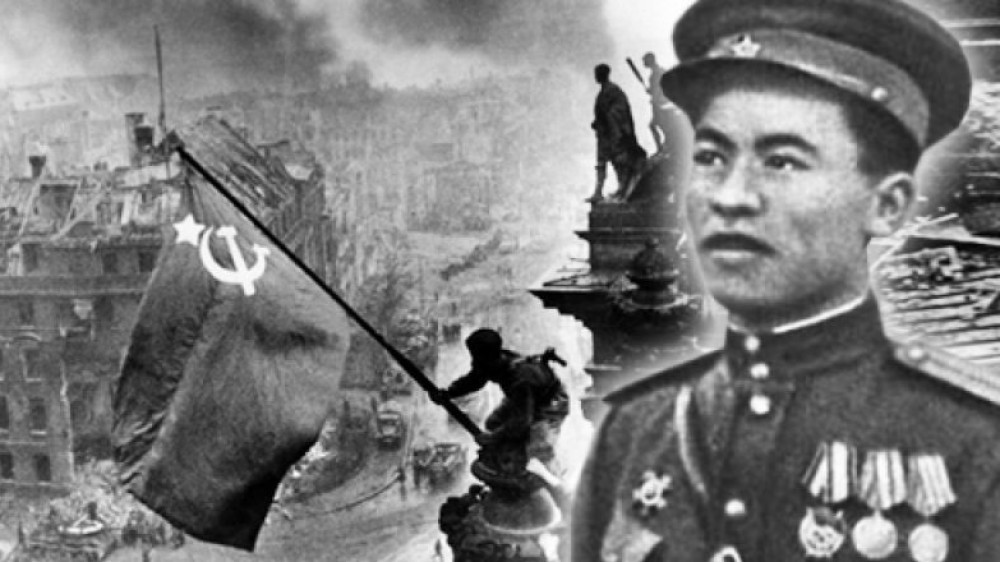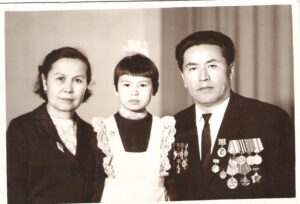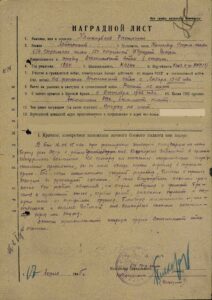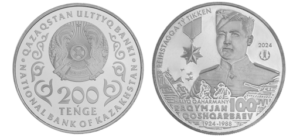ASTANA — Kazakhstan is commemorating the 100th anniversary of Lieutenant Rakhimzhan Koshkarbayev on Oct. 19. Koshkarbayev, a national hero, raised the Soviet flag over the Reichstagwith with Grigory Bulatov on April 30, 1945, marking the defeat of Nazi Germany. This daring act, performed during the final days of World War II, remains a pivotal moment in Kazakhstan’s wartime history.

Koshkarbayev, a national hero, alongside comrade Grigory Bulatov, hoisted the Soviet flag over the Reichstag on April 30, 1945, marking the defeat of Nazi Germany. Photo credit: Tengrinews
Although Soviet authorities initially did not recognize Koshkarbayev’s actions, he was posthumously awarded the title of Halyk Kakharmany (People’s Hero) in 1999. In 2005, Russian historians officially acknowledged that Koshkarbayev and Bulatov were the first to raise the Soviet flag during the Reichstag’s storming.
In April, President Kassym-Jomart Tokayev signed amendments to rename the three degrees of the Aibyn Order after legendary figures, including Koshkarbayev. The award honors bravery and dedication in military service.
A childhood and military beginnings
Born in 1924 in Kyrykkudyk, the Akmola Region, Koshkarbayev faced hardships early in life. His mother passed away when he was four, and his father was politically repressed when he was 13, leaving him to grow up in an orphanage. Despite these challenges, he excelled at the Frunze Military Infantry School, graduating with honors in 1944 and becoming a second lieutenant in the Soviet Army.

Rakhimzhan Koshkarbayev, his wife Rakhilya and daughter Aliya. Photo credit: Tengrinews
“He demonstrated strong organizational skills and determination, earning an excellent grade. Disciplined and demanding of both himself and his subordinates, he is physically fit and resilient during hikes. He diligently approaches his duties and actively participates in the company’s Komsomol activities. Sociable and well-liked by his comrades, he is popular among the cadets and has the potential to lead as a combat platoon commander,” reads the 1944 document, which the Russian Ministry of Defense declassified in 2007.
By 1945, Koshkarbayev led a rifle platoon in key battles, demonstrating exceptional bravery in combat. Two weeks before his historic act at the Reichstag, he was awarded the Order of the Patriotic War of the First Degree for bravery in battle.
The 1945 report recounts: “In the April 16, 1945 battle, Rakhimzhan Koshkarbayev led an assault battalion against fierce enemy resistance. At the head of his squad, he was the first to break into the enemy’s trench. The fighting was intense, culminating in hand-to-hand combat. When a grenade fragment destroyed Koshkarbayev’s machine gun, he charged the enemy machine-gun position, killing the crew with a grenade, seizing the weapon and opening fire. His exceptional bravery and decisive actions allowed him to complete the mission.”
Leading the charge to Berlin
Archival records reveal that Koshkarbayev’s unit advanced from the Oder River to the heart of Berlin in just a few weeks, eliminating 200 enemy soldiers along the way. On April 17, 1945, his platoon crossed the Friedlanderstrom Canal, securing a bridgehead on the western bank.

Archival document, declassified in 2007 by the Russian Ministry of Defense describes Koshkarbaev’s bravery and assignment of Order of the Patriotic War of the first degree . Photo credit: pamyat-naroda.ru
“In the battle on April 29, 1945, the platoon was among the first to cross the Spree River, breaking the fierce resistance of the enemy. On April 30, 1945, he broke into the Reichstag and hoisted the Victory banner (…) He deserves to be awarded the title of Hero of the Soviet Union,” reads the 1945 document.
The same document credits Koshkarbayev’s platoon with neutralizing over 200 German soldiers, capturing 184 more, and seizing 14 field guns, 27 heavy machine guns and additional weaponry. Despite their achievements, the Soviet command did not immediately recognize Koshkarbayev and Bulatov’s efforts. Instead, Mikhail Yegorov and Meliton Kantaria, who raised a second flag the next day, were awarded the title of the Hero of the Soviet Union.
Koshkarbayev’s contributions were only acknowledged thanks to the efforts of representatives of the Kazakh intelligentsia, including military officer Bauyrzhan Momyshuly, journalist Kakimzhan Kazybayev, and writers Gabit Musrepov and Gabiden Mustafin.
A hero remembered
After the war, Koshkarbayev served in public life, becoming a deputy in Almaty and remaining active in veterans’ organizations. For more than twenty years, he served as the director of the Alma-Ata Hotel. He also authored two memoirs, The Banner of Victory and Assault: Day 1410, chronicling his experiences.
His military record includes honors such as the Orders of the Red Star and the Patriotic War. However, his most significant recognition came posthumously, as his role in one of World War II’s most iconic moments gained broader acknowledgment.

The National Bank issues collectible coins dedicated to the 100th anniversary of Rakhimzhan Koshkarbayev. Photo credit: nationalbank.kz
In a Feb. 7 interview with Kazpravda, Koshkarbayev’s daughter, Aliya, described her father as a cheerful man who maintained a positive outlook despite the hardships of war. As director of the Alma-Ata Hotel, he hosted countless local and foreign delegations, supporting artists and creative people.
Koshkarbayeva noted that after the war, he developed a philosophy of living in the moment and being grateful for surviving, rarely speaking about the war except to honor his comrades. She recalled their Almaty home as a place filled with friends and guests, especially on weekends, with her father remaining a devoted family man.
Kazakhstan continues to honor Koshkarbayev’s legacy, with schools, streets and memorials named in his honor. His bravery and resilience remain a source of national pride, embodying the spirit of a true hero.
